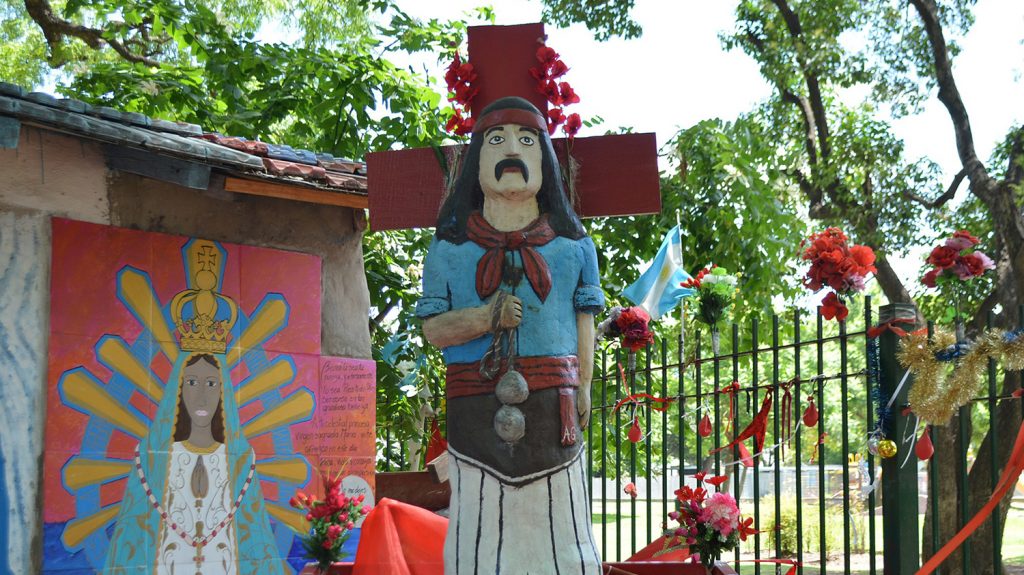It is the feast day of Gauchito Gil (above), the cowboy folk saint, who died today in 1878 in the city of Mercedes, Argentina. Gil was a ranch hand and gaucho (horseman) who became an outlaw in the mould of Robin Hood, with a reputation for evading the law, dodging bullets, giving to the poor, and even curing illnesses. Legend says he was captured and summarily executed, but his last words were a promise to heal the sick son of his executioner. When the boy recovered from his illness, the Gauchito’s new career as a folk saint was born. Today his devotees will celebrate at his numerous roadside shrines, which are decorated with red flags, figurines and flowers, and masses will be sung in the churches of Mercedes.
Jesus to a Child, a song written and sung by George Michael, was released today in 1996 and entered the UK pop chart at number one. The song, a melancholy ballad to Michael’s lover Anselmo Feleppa, who had died three years earlier, is notable for its tender evocation of the relationship in the refrain: ‘You smiled at me / Like Jesus to a child’. After Michael’s death in 2016, it was revealed that he had donated all the single’s royalties to Childline, a counselling service for children.
Thomas Aikenhead, a 20 year-old Edinburgh student, became the last person in the British Isles to be executed for blasphemy today in 1697. Aikenhead, who was sceptical about Christianity, had been accused and found guilty of calling the Old Testament ‘Ezra’s fables’, the New Testament ‘the history of that imposter Christ’, and theology ‘a rhapsody of ill-invented nonsense’. Despite his youth, the honesty of his doubts, and the fact that this was his first time in court, Aikenhead received a death sentence on Christmas Eve. On the afternoon of his death he was marched under guard the two miles from Edinburgh to the Gallowlee in Leith, where he read aloud the penitential 51st psalm, and then, ‘surprised and terrified’, according to an eyewitness, he was hanged. The day before, the Church had been given a final opportunity to effect his reprieve, but instead pressed for his execution.
‘It is a principle innate and co-natural to every man to have an insatiable inclination to truth, and to seek for it as for hid treasure… After much ponderings I found my education altogether wrong, not only because it was impossible for me or any that I conversed with, to produce any grounds really sufficient to confirm the same; but with the greatest facility sufficient ground could be produced for the contrair. And this I profess and declare was the only cause that made me assert the things that I asserted, and deny the things that I denied.’ Thomas Aikenhead, speech before his execution
Five young American missionaries were speared to death by a group of tribal warriors in the rainforest of Ecuador today in 1956. Jim Elliot and his four colleagues had been trying to establish contact with the Waodani, a small, reclusive tribe of hunter-gatherers known for their violence and their hostility to outsiders. After several days of giving gifts to the Waodani from their circling plane, the missionaries landed and set up camp on a sandbar of the River Curaray, but were attacked when an internal conflict in the tribe was redirected against them. The tragedy, reported widely in the media and retold in Elisabeth Elliot’s book, Through Gates of Splendor, became a powerful and moving testimony of sacrificial love, inspiring evangelical missionary work around the world.
Galileo Galilei died today in 1642. He remained under house arrest until the last, according to the strict instructions of the Roman Inqusition, which had found him ‘vehemently suspected of heresy’ for holding that ‘the Earth moves and is not the centre of the world’. He was buried in a small, cupboard-sized room at the back of Santa Croce in Florence, because Pope Urban VIII, his great opponent, insisted he should not be honoured in death. His body was moved into a proper monument in the main church a century later.
‘This universe which I with my astonishing observations and clear demonstrations had enlarged a hundred, nay, a thousandfold beyond the limits commonly seen by wise men of all centuries past, is now for me so diminished and reduced, it has shrunk to the meagre confines of my body.’ Galileo lamenting the loss of his sight three year before he died
Image: ProtoplasmaKid / CC BY-SA 4.0
